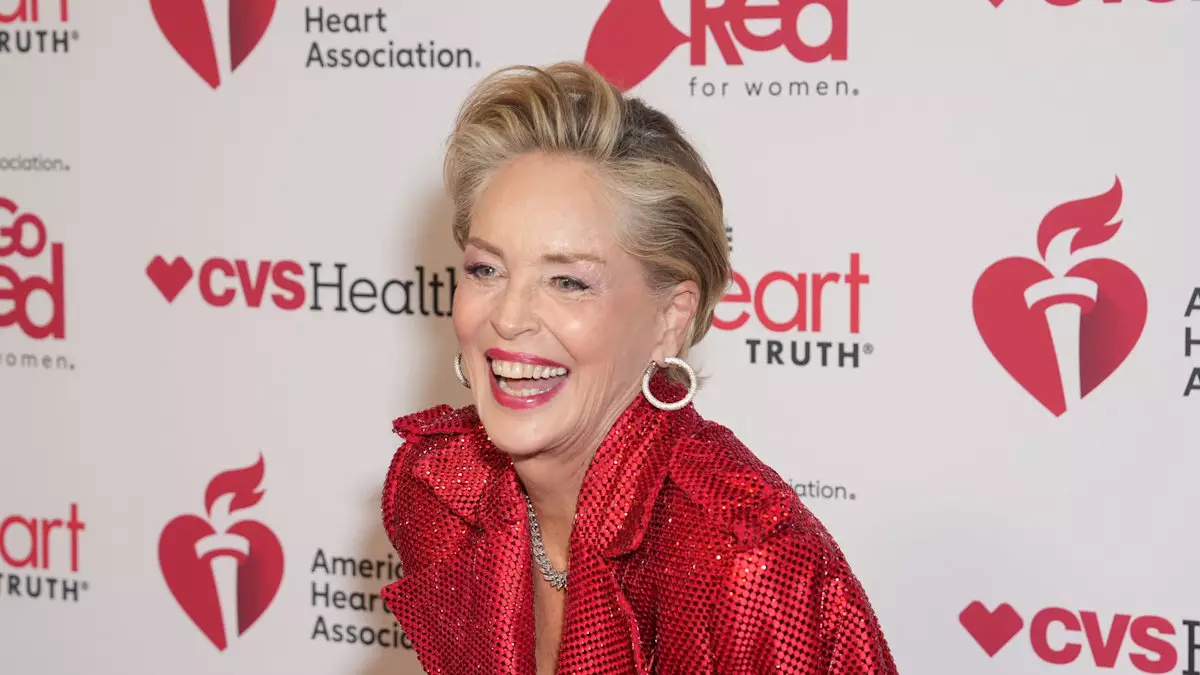Sharon Stone, a veteran actress renowned for her captivating performances, has transformed her personal trials into profound advocacy for women’s health issues. Her life took a dramatic turn in 2001 when she suffered a stroke that not only threatened her career but also her very existence. This health crisis catalyzed her involvement in promoting awareness surrounding cardiovascular health, particularly in women, a demographic often overlooked in medical research.
Stone’s advocacy took center stage at the American Heart Association’s Go Red for Women Red Dress Collection Concert, where she joined a host of celebrities dedicated to highlighting cardiovascular issues. At the event, she expressed gratitude for surviving the life-altering stroke, underscoring her view that women’s health must take precedence in the healthcare narrative. This impassioned commitment stems not only from her experiences but also from a broader recognition of systemic failings in addressing women’s health needs.
During her time on the red carpet, Stone criticized the longstanding neglect of women’s health in medical research and treatment. Quoting historical biases, she pointed out how the medical community primarily focused on male health issues up until the early 2000s. “We tested hormones on men, and we wonder why these health issues exist,” she articulated. Stone’s sentiments highlight a critical understanding that health research must include diverse populations to formulate effective practices.
Her assertion that hormone imbalances can lead to severe health issues like strokes showcases the urgent need for tailored healthcare solutions for women. Stone believes that without adequate investment in women’s health research, society risks diminishing the quality of care available, ultimately threatening the lives of women.
Beyond advocating for women’s health, Sharon Stone has shared insights about the challenges of re-entering Hollywood after such a profound health crisis. It took her seven years to reclaim her place in the industry—a time characterized by immense physical and emotional recovery. Stone has reflected candidly on this transition, describing the struggle of returning to a landscape that had moved on without her. “In seven years, you’re no longer the flavor of the time; you no longer have box office heat,” she explained.
This wilderness time often leaves individuals feeling sidelined and undervalued. The stark reality that the world does not pause for personal crises can be disheartening. Yet, in her journey, Stone found resilience and came to terms with her changed status in an evolving industry. Her story serves as a powerful reminder that recovery is not merely about healing from a physical ailment but also about reclaiming one’s identity in a dynamic world.
Stone’s candid conversations about her health not only focus on physical well-being but also touch on the emotional challenges that accompany such battles. The toll of her stroke involved not just a physical overhaul but a complete shift in how she perceived herself and her abilities. Describing her experience, she mentioned, “I bled into my brain for nine days, so my brain was shoved to the front of my face.” The ensuing challenges, including the alteration of her senses and cognitive functions, highlighted the severity of her ordeal.
Even years after her recovery, Stone vividly recalls the loss of basic functions that many take for granted. The impact of health struggles ripples through one’s life, irrevocably altering how individuals engage with the world around them. As she recently stated, her experience involved not only survival but a deep transformation and profound appreciation for life itself.
Today, Sharon Stone stands as a beacon of resilience and advocacy. By sharing her journey, she hopes to inspire conversations around women’s health and the critical need for medical research inclusivity. Her powerful narrative is a reminder of the importance of health awareness, ongoing education, and the necessity of women’s voices in health discussions. Stone’s story resonates as a compelling call to action, emphasizing that healthcare systems must adapt and evolve to meet the needs of all genders, ensuring no one is left behind. Through her advocacy and personal resilience, she continues to empower women to prioritize their health and well-being, creating a legacy that transcends her remarkable career in film.

